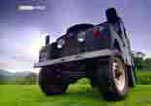By Andy Grafton
"Don't bother with gear timing on a petrol, I've never heard of a LR engine chain breaking like diesel belts do, there's less load on a petrol drive (no injector pump).
Camshafts:- Engines with serial nos. beginning 361 have the petrol cam.
Timing:- IVO 6* BTDC, IVC 52* ABDC, EVO 34* BBDC, EVC 24* ATDC. (Part no 274709 stamped on it). 991 and 366 engines have the diesel type cam, part no 274711.
Timing:- IVO 16* BTDC, IVC 42* ABDC, EVO 51* BBDC, EVC 13* ATDC.
The main difference is the diesel type cam has slightly more lift and opens for six degrees longer. Average diesel cylinder pressures are lower so you tend to open the exhaust valve slightly earlier to give the gas time to escape. That does not necessarily mean it will benefit the petrol's economy to have the same timing as you may waste useful cyl pressure. Comparing the 2 1/4 petrol and diesel/2.5 cams, the 2 1/4 petrol inlet valve closes 10 degrees later (52*/42*) and the exhaust opens 17 degrees later (34*/51*) - quite a big difference.
If you advanced the timing on a standard petrol cam by 4*, using the adjustable keyways you would get:- IVO 10* BTDC, IVC 48* ABDC, EVO 38* BBDC, EVC 20* ATDC. E.P. would be 99* BTDC using a DTI guage for timing.
The inlet valve still opens late so smooth idle will not be affected, it closes 4* earlier so low speed torque should be marginally improved, the exhaust opens slightly earlier so you should get less pumping loss but without losing useful pressure. The exhaust closing earlier will have the least effect, but overall the torque output will probably be higher, but peak slightly lower down the rev range than before, everything else being left alone. As a result, you will likely lose a couple of BHP, but get it back again as a result of the higher compression ratio. ".



















